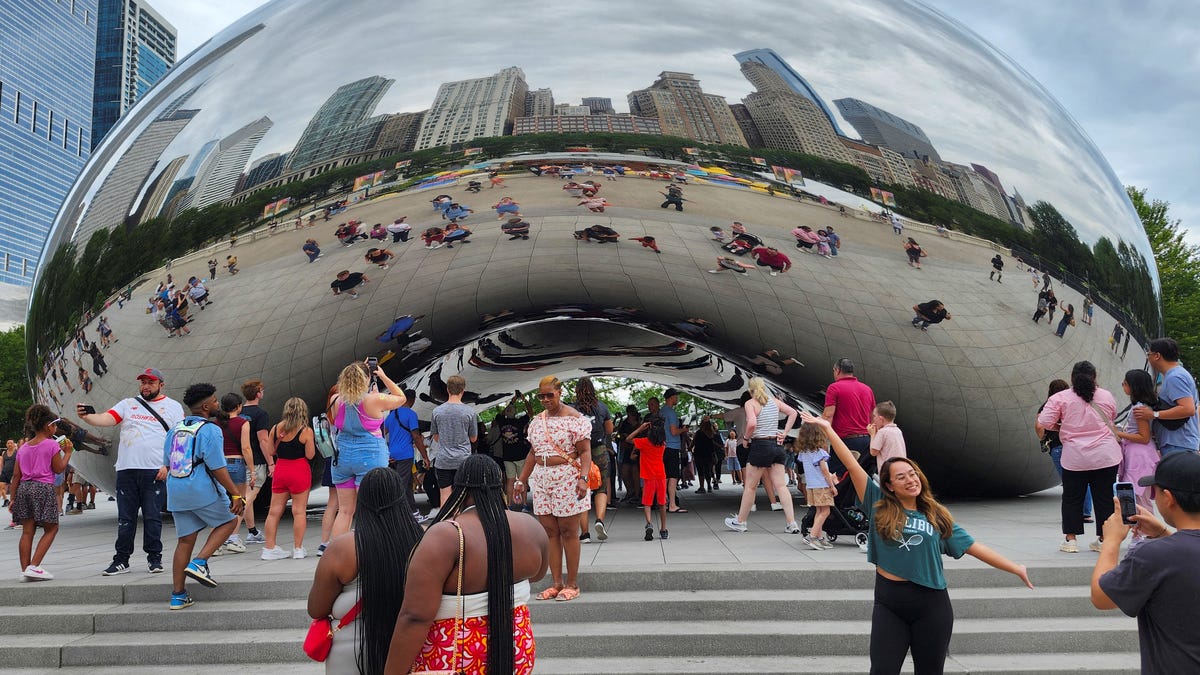As the DNC starts in Chicago, here’s what locals want you to know
What’s often overlooked in the news about this city: The experience of living in Chicago
This week, Chicago hosts the Democratic National Convention, which has sparked widespread criticism of the city.
In an exaggerated tone, New York Post columnist Miranda Devine labels Chicago as a failing city and quotes someone saying, “Democrats wanted a safer venue, but they couldn’t choose Beirut.”
On Fox News’ Facebook post discussing comparisons between the 1968 DNC and today, comments like “Dismantle Chicago brick by brick for an improvement” and “It’s sh-tcago—the perfect spot for the criminals responsible for its chaos!” can be seen.
What’s frequently absent from the discussions in the media is the actual experience of residing in Chicago.
From ‘The Bear’ to the Chicago skyline to the Obamas
Shows like “The Bear” on Hulu and this season of HBO’s “Hard Knocks” featuring the NFL Bears provide glimpses into Chicago’s rich culture: from its diverse food options, vibrant music scene including blues and hip-hop, impressive skyscrapers, the “L” train, and scenic lakefront trails. Throw in iconic figures like the Obamas, Oprah, Bill Murray, Ye, and a plethora of cultures, and you get a lively and diverse city with something for everyone that defines Chicago.
Our extensive surveys of Chicago residents reveal much more about the city. The Harris Poll has been exploring the opinions of Chicagoans over the last five years.
Residents express a variety of opinions about their city, often contradictory, yet united on many significant matters.
Here’s the information:
Insights from Chicago residents to the Harris Poll
We appreciate Chicago’s offerings. Almost two-thirds of Chicagoans regard summer festivals and major events like Lollapalooza or NASCAR’s Street Race in Grant Park as key aspects of the city’s identity. Half believe they make Chicago stand out from other American cities. The city’s parks, public areas, and museums are cherished, yet often overlooked nationally.
The bottom line is that three-quarters of residents would recommend Chicago as a great place to both live and visit.
We are growing weary of high taxes. While nearly half of Chicagoans feel the local economy is at least as good (49%) or better (21%) than other cities, a significant 60% believe that local taxes and fees are excessively high compared to other places.
Moreover, many residents think taxes are becoming increasingly burdensome: In April, 51% felt their tax bills rose from the previous year, possibly explaining why voters recently rejected a proposed property tax increase by Mayor Brandon Johnson aimed at funding shelters for the homeless.
We are avid sports fans, but only to a point. Currently, four of Chicago’s professional sports teams are planning either new stadiums or expansions costing billions, with hopes for some public funding.
While 80% of locals identify as fans of Chicago sports teams, 61% oppose the idea of public funding for professional sports stadiums.
We have concerns about safety. Violent crime rates are concerningly high, surpassing other cities. In the last year, Chicago experienced more homicides (617) than New York City or Los Angeles, despite their larger populations.
Although the number of homicides has decreased since the peak in 2021, at least 364 murders have been recorded by mid-August this year. Given this reality, it’s understandable that crime consistently remains the top worry for residents, noted by 70% in one survey and 98% in another.
We’re frustrated with our city officials. After one year in office, Chicago residents were asked to rate Mayor Johnson’s performance. Only 9% rated his performance as above average, while half rated it below average. Just 20% felt he was prioritizing the right issues. (The previous mayor, Lori Lightfoot, also had low approval ratings and did not make it to the runoff in last year’s election.)
We’re not as progressive as you might think. While Mayor Johnson is advocating for a progressive agenda focused on raising taxes and fees to fund housing and social services for marginalized communities, the political landscape reveals otherwise. In our polls, 50% of respondents describe their political views as moderate,
34% identify as liberal and 16% as conservative. How can we account for Johnson’s election? His supporters showed up to vote, while 61% did not participate at all.
Our food preferences are quite straightforward. Chicago is home to Michelin-star restaurants that offer tasting menus costing $400 or more per person. Yet, to truly reflect Chicago’s essence, we favor local eateries like Portillo’s hot dog joints (71%), popular pizza places such as Giordano’s (65%), and Lou Malnati’s (54%), along with Al’s Italian Beef (56%), known as a competitor to Mr. Beef from “The Bear” series.
Media portrayals can misrepresent Chicago. For decades, TV shows and films have been set in Chicago ‒ the One Chicago series will continue at least until 2025 ‒ and slightly over half of adults surveyed believe they positively affect the city’s image.
However, Chicago residents don’t share the same sentiment regarding media coverage. More than a third believe national news often presents a more negative view of Chicago than reality, and 20% express similar concerns about local news. (We’ll hold off on evaluating media performance during the Democratic National Convention.)
Chicago is a vibrant global hub for living, working, and conducting business, and I take pride in pursuing all three in my hometown.
While locals might complain, they also recognize that the simplistic generalizations seen in headlines fail to depict the true life of the city. The reality here is much like in many other places: a beautifully intricate mix of subtleties.
Will Johnson is the Chicago-based CEO of The Harris Poll, one of the leading firms worldwide in public opinion, market research, and strategic analysis.

